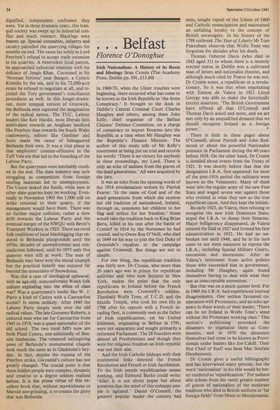. . . Belfast
Florence O'Donoghue
Irish Nationalism: A History of its Roots and Ideology Sean Cronin (The Academy Press, Dublin pp. 391, £13.60) In 1969-70, when the Ulster troubles were beginning, there occurred what has come to be known in the Irish Republic as 'the Arms Conspiracy.' It brought to the dock in Dublin's Central Criminal Court Charles Haughey and others, among them John Kelly, chief organiser of the Belfast Citizens' Defence Committee, on a charge of conspiracy to import firearms into the Republic at a time when Mr Haughey was the Republic's Finance Minister. The author of this study tells of Mr Kelly's resentment at being put on trial and records his words: 'There is no victory for anybody in these proceedings, my Lord. There is only an echo of sadness from the graves of the dead generations.' All were acquitted by the jury.
It was an echo from the opening words of the 1916 proclamation written by Patrick Pearse: 'In the name of God and of the dead generations from which she receives her old tradition of nationhood, Ireland, through us, summons her children to her flag and strikes for her freedom.' Some would take the tradition back to King Brian Boru, killed in his tent after the battle of Contarf in 1014 by the Norsemen he had routed, and to Owen Roe O'Neill, who died in 1649 on his way to join the first Duke of Ormonde's royalists in the campaign against Cromwell. But things are not so simple.
For one thing, the republican tradition was fairly new. Dr Cronin, who more than 20 years ago was in prison for republican activities and who now lectures in New York, makes the point that the only republicans in Ireland before the French Revolution were Cromwell's soldiers. Theobald Wolfe Tone, of T.C.D. and the Middle Temple, who took his own life in 1798 after his capture with a French invading fleet, is commonly seen as the father of Irish republicanism, yet his United Irishmen, originating in Belfast in 1791, were not separatists and sought primarily a reformed Parliament. The 28 founders were almost all Presbyterians and though they were for religious freedom an Irish republic was not their aim.
And the Irish Catholic bishops with their continental links detested the French Revolution and French or Irish Jacobinism. To the Irish people republicanism meant nothing, and Edmund Burke could write: 'Alas! It is not about popes but about potatoes that the mind of this unhappy people is agitated.' Daniel O'Connell, the greatest popular leader the country had seen, sought repeal of the Union of 1800 and Catholic emancipation and maintained an unfailing loyalty to the concept of British sovereignty. In his history of the 1798 outbreak The Year of Liberty Mr Tom Pakenham observes that Wolfe Tone was forgotten for decades after his death.
Thomas Osborne Davis (who died in 1845 aged 31) to whom there is a recently erected statue in Dublin was a cultivated man of letters and nationalist theorist, and although much cited by Pearse he was not, Dr Cronin notes, a republican or a revolutionary. So it was that when negotiating with Eamon de Valera in 1921 Lloyd George was able to make the historically correct assertion: 'The British Government have offered all that O'Connell and Thomas Davis asked and more, and we are met only by an unqualified demand that we should recognise Ireland as a foreign power.'
There is little in these pages about O'Connell, about Parnell and John Redmond or about the powerful Nationalist presence in Parliament during the 40 years before 1918. On the other hand, Dr Cronin is detailed about events from the Treaty of 1921. It was shortly before that that the designation I.R.A. first appeared: for most of the post-1916 period the militants were known as the Volunteers. Many of them went into the regular army of the new Free State and waged severe war againct those who resisted in what they saw as the true republican cause. And they kept the initials.
By early 1923, de Valera, then refusing to recognise the new Irish Dominion State, urged the I.R.A. to dump their firearms. Major belligerency disappeared, de Valera entered the Dail in 1927 and formed his first administration in 1932. He had an unbroken run until 1948, and he in his turn came to use stern measures to repress the I.R.A., including Special Military Courts, executions and internment. After de Valera's retirement from active politics those who succeeded him in government, including Mr Haughey, again found themselves having to deal with what they saw as unacceptable extremism.
But that was on a much quieter level. For in 1969 the I.R.A. had experienced internal disagreements. One section favoured cooperation with Protestants, and an echo appears in these words of their leader; 'There can be no Ireland in Wolfe Tone's sense without the Protestant working class.' This section's politicising provoked the dissenters to stigmatise them as Communists, and in 1970 the dissenters themselves had come to be known as Provisionals under leaders like Joe Cahill. Their first Chief of Staff was Sean Mac Stiofain (Stephenson).
Dr Cronin gives a useful bibliography and has interviewed many persons, but the word 'nationalism' in his title would be better rendered as 'republicanism.' For sadness also echoes from the vastly greater number of graves of nationalists of the moderate tradition who died in British uniform in 'far foreign fields' from Mons to Mesopotamia.






































 Previous page
Previous page